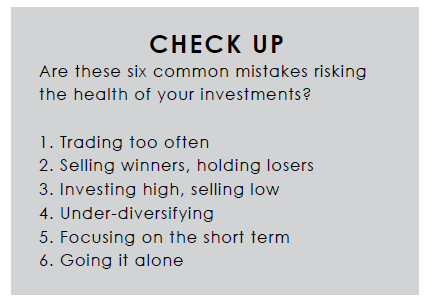Avoiding Five Common Behavioral Mistakes

We like to think of ourselves as rational investors, but sometimes our actions indicate otherwise. Despite education and experience, research done in the field of behavioral finance—a combination of psychology and finance that analyzes why and how people make financial decisions—suggests that the majority of people are subject to psychological biases. One example is the safety in numbers that signals us to follow the herd.
While often unconscious, these common biases can cloud our judgment and cause us to make decisions that are not in our best interest. The good news is that simple awareness of the behavioral pitfalls of investing is the first step to minimizing or avoiding them.
Five Common Biases
Researchers have identified scores of different behaviors and biases that affect investing decisions. Here are the five most common behavioral biases that lead to errors and ways to be aware of them to avoid making common mistakes.
- Loss Aversion
Most people would prefer to realize a gain than incur a loss. But human nature goes a step further by making us react more strongly to losses than gains, putting us at risk of selling winning investments too soon and holding onto losing investments for too long. - Anchoring and Conservatism
Anchoring can be found in everyday behavior. You shop for an appliance and use the price of the first model you see as a reference point for all subsequent choices. Anchoring is even more common when dealing with more complex concepts, such as investing. Setting a reference point provides a level of comfort and security, even if it may actually cause harm in the long term. Like loss aversion, this can lead to selling winners too soon and holding on to losers for too long. - Availability/Overreaction
Availability bias is similar to anchoring in that it suggests that recently observed or experienced events strongly influence decisions. For instance, researchers found that individuals were likely to overestimate the chances of being in a car crash if they had seen a car crash on a recent journey. Likewise, shark attacks, big lottery wins, and other headline events affect our judgment, convincing us that a given prospect is more likely just because it is fresh in our minds.
In the investing world, people tend to subconsciously overweight events that have occurred recently. For example, investors may be more likely to be fear ful of a stock market rout when one has occurred in the recent past. They may be more likely to take on more risk if the market has recently rallied or less if it has recently fallen. Or they may judge the quality of an investment based on information that was recently in the news, ignoring other relevant facts. - Herd Mentality
Following the crowd is a common behavior shared by humans and animals alike. It can be very useful in many situations—but investing is not among them. Investors who follow the herd tend to buy a “hot” stock or sell in a panic when the market drops. Instead of using their own information or making independent decisions, they simply do what others are doing.
The idea of herding is particularly relevant in the domain of finance. Stock market anomalies, such as bubbles and crashes, are often created by investor groupthink and herding in one direction regardless of risk. Momentum investors attempt to take advantage of the herding instinct by basing buy and sell decisions on the
“momentum” of a stock price. Contrarians, on the other hand, attempt to do the opposite, buying when other people are selling and selling when other people are buying. - Overconfidence
Self-confidence is generally considered to be a positive trait. But too much of it can be a bad thing, especially when it comes to investing. Overconfident investors tend to mistake luck for skill. They see success as something they caused, but blame setbacks on external forces. They trade more actively than they should. They also tend to chase returns, underestimate risk, and overestimate theirinvestment results. Such behaviors can lead to costly mistakes and take a dramatic toll on long-term portfolioperformance.
The Bottom Line
These biases can ultimately lead to poor decisions and investing mistakes. Left unchecked, subconscious biases produce a powerful tendency toward mistakes and counterproductive decisions. If you recognize some of these biases in yourself or find yourself prone to these mistakes, The Private Bank at Union Bank can offer the professional guidance and support that helps you make more disciplined investment decisions. To learn more, please contact Holly Arellano at 818.706.4848 or holly.arellano@unionbank.com.

Wealth planning strategies have legal, tax, accounting, and other implications. Prior to implementing any wealth planning strategy, clients should consult their legal, tax, accounting, and other advisers.


